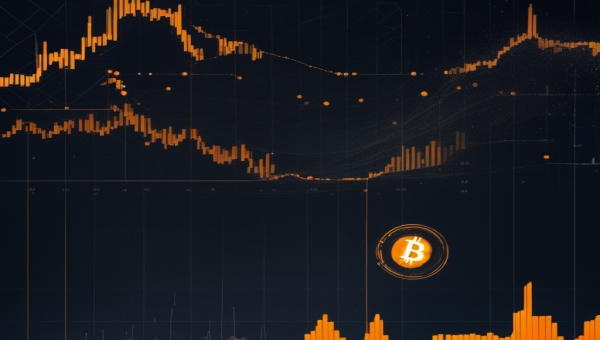Table of Contents:
Introduction: The Phenomenon of Bitcoin's Meteoric Rise
Bitcoin's story is one of the modern financial world's most invigorating tales. From its humble beginnings in 2009, Bitcoin has transformed from being an obscure digital asset into a financial powerhouse. Its meteoric rise has shocked everyone, and it continues to break new grounds in the finance industry. Understanding the key to Bitcoin’s success often lies in interpreting Bitcoin Chart Patterns. Chart patterns give traders crucial hints about Bitcoin's future price movements, helping to decode the mystery behind the cryptocurrency's extraordinary journey.
Understanding Bitcoin Chart Patterns
'Bitcoin Chart Patterns' serve as a compass in the tumultuous sea of cryptocurrency trading. They are graphical representations of Bitcoin's price movements over specific periods. By analyzing these patterns, traders can predict possible future price trends, making informed trading decisions. This component of technical analysis is crucial for both novice and experienced traders to understand the rhythm of Bitcoin's market.
Pros and Cons of Bitcoin's Skyrocketing Growth
| Key Pattern | Pro | Con |
|---|---|---|
| Volatility | High potential for returns | Increases potential for loss |
| Liquidity | Easy to buy and sell | Price can be affected by large buys or sells |
| Demand and Supply | Increasing demand leads to price hikes | A sudden influx of supply can crash the market |
| Regulations | Possible future adoption by institutions | Current legal grey area |
Why are Chart Patterns important?

Chart patterns act as windows into Bitcoin's market psychology. They reflect collective actions and sentiments of all market participants - buyers, sellers, investors, and traders amidst varying market conditions. The resulting graphical formations on the price charts are then studied to gain valuable insights. Recognition of these patterns assists traders in forecasting potential price outcomes, understanding market sentiment, and formulating decisive trading strategies.
Accuracy in predicting price trends can minimize losses and optimize gains, making chart patterns an absolutely vital tool in the financial trading industry. For Bitcoin, where market conditions can drastically swing within moments, the importance of recognizing and understanding these patterns is amplified.
Common Bitcoin Chart Patterns
Let's dive into understanding some of the common Bitcoin Chart Patterns that traders often encounter:
1. Head and Shoulders

The Head and Shoulders pattern is commonly viewed as a prediction marker for a reversal scenario in Bitcoin's price trend. The pattern consists of three peaks with the middle one (the Head) being the highest and the other two (the Shoulders) being nearly equal in height.
2. Double Top and Double Bottom
These patterns typically signify a dramatic shift in trend. In the double top pattern, Bitcoin hits a particular price level twice before reversing towards a downtrend. Meanwhile, the double bottom pattern indicates a reversal to an uptrend after Bitcoin hits a certain price level twice.
3. Bullish and Bearish Flags

Flag patterns are continuation patterns and are characterized by a sharp price movement (the 'flagpole'), followed by a period of consolidation that forms the 'flag'. A Bullish Flag pattern indicates a probable continuation of an uptrend, while a Bearish Flag pattern suggests a likely continuation of the downtrend.
Understanding these Bitcoin Chart Patterns can provide valuable insights into Bitcoin's price action, arming traders with the knowledge to predict potential market shifts and make more informed trading decisions.
Head and Shoulders Pattern
The Head and Shoulders pattern holds high popularity among both traditional and crypto traders. It is typically identified by its three-part sequence: the left shoulder, the head, and the right shoulder. Each part represents a peak, with the head being the highest peak and the shoulders at lower levels. When connected by a 'neckline,' an imaginary line drawn across the lowest points of the two troughs, it forms the complete pattern.
This formation usually emerges at the end of an uptrend, signaling the weakening of the bulls and the strengthening of the bears. It predicts a potential trend reversal, indicating that Bitcoin's price may flip from an uptrend to a downtrend. Recognizing this pattern early can equip traders to adjust their strategies accordingly, potentially protecting their investments from downturns.
Double Top and Double Bottom Pattern
Double Top and Double Bottom patterns are classic indicators of impending trend reversals in the crypto trading world. The Double Top pattern, visually resembling an "M", signifies a bearish reversal following a clear uptrend. It forms when Bitcoin's price hits a particular resistance level twice, but fails to break through on both occasions. This inability to surpass the resistance level on the second try signals selling pressure, indicating a possible price plunge in the foreseeable future.
The opposite of the Double Top is the Double Bottom pattern, visually shaped like a "W". Following a noteworthy downtrend, this pattern forms when the price hits a specific support level twice, but doesn't succumb to further downfall. The failure to break through the support level on the second occasion implies a strong buying pressure. This can often predict an impending bullish reversal, meaning that the Bitcoin's price could be set to rise again.
Both these patterns serve as useful representations of pivotal moments in Bitcoin trading, marking the shift of the market's momentum. Traders often resort to these patterns to confirm changes in trend direction and adjust their trading strategies accordingly.
Cup and Handle Pattern
The Cup and Handle is another essential pattern that Bitcoin traders should be familiar with. This pattern is named because it resembles a teacup when viewed from the side. It features a 'cup' - a round bottom that demonstrates an uptrend, and a 'handle' - a small downtrend immediately following the cup, which is a period of consolidation before the price climbs again.
This pattern generally signifies a bullish market and indicates that Bitcoin's price is likely to witness a significant upward movement after the 'handle' phase. It means that the bears have tried to pull the price down, but failed - leading to a stronger bullish market.
The Cup and Handle pattern is a critical marker of continued uptrend, highlighting a period of accumulation before a further rise in price. Therefore, recognizing and understanding this pattern could prove incredibly profitable for Bitcoin traders.
Flags and Pennants Pattern
Flags and Pennants patterns are highly utilized in Bitcoin's trading world due to their accuracy in predicting trend continuations. Both formations appear during periods of strong uptrends or downtrends and are typically associated with sharp price movements.
A Flag pattern is represented on a chart by a sharp rise in Bitcoin's price, followed by a generally downward trending rectangular consolidation period. This consolidation is the 'flag' which forms on the pole. When Bitcoin's price breaks out of the flag, it typically resumes the previous trend, continuing on its path upwards.
Similar to Flags, Pennants are also trend-continuation patterns. These patterns are distinguished by a period of consolidation following a strong price movement, the difference being that the consolidation period is narrow, forming a triangle or a pennant. Like Flags, the breakout from the pennant foreshadows the continuation of the prior trend.
Both Flags and Pennants patterns provide substantial hints about a continuation in the prevailing trend. Accurate spotting of these formations allows traders to ride the trend and potentially secure profitable trades.
Conclusion: The Importance of Analyzing Bitcoin Chart Patterns
In conclusion, the analysis of Bitcoin Chart Patterns forms a critical part of the trading toolkit, enabling traders to make informed predictions about potential price movements. By uncovering hidden clues within market trends, these graphical markers usher in an era of strategic trading, helping traders navigate the notoriously volatile landscape of cryptocurrencies.
Each pattern - the Head and Shoulders, Double Top and Bottom, and the Bullish and Bearish Flags- carries distinctive implications that provide vital insights into the market psyche. Learning to identify and interpret these patterns allows traders to gauge market momentum, predict trend reversals, and spot lucrative trading opportunities.
The importance of analyzing Bitcoin Chart Patterns conveys an immutable truth in the financial realm - that knowledge is power. Turning a blind eye to these patterns could mean overlooking essential signals and trading opportunities. With diligence and proficiency in understanding these patterns, traders can enhance their trading skillset and possibly, their profits as well.
As the story of Bitcoin's meteoric rise continues to unfold, the ability to read and understand Bitcoin Chart Patterns will remain an invaluable asset in the financial trading industry.
Understanding Bitcoin's Astronomical Growth: Key Chart Patterns Explained
What kick-started Bitcoin's meteoric rise?
Bitcoin's meteoric rise was triggered by a combination of increased institutional interest, the COVID-19 pandemic crisis, and its third halving event. This led to increased buying pressure and a surge in price.
What are the key chart patterns in Bitcoin's growth?
Key chart patterns in Bitcoin's growth include the "bull flag" pattern, the "Rising Wedge", the "Descending Channel", and the "Cup and Handle". Each of these patterns signified important price movements in Bitcoin's history.
How did the third halving event impact Bitcoin's price?
The third halving event reduced Bitcoin's block reward from 12.5 to 6.25 Bitcoins, making the cryptocurrency more scarce and driving up the price due to increased demand and reduced supply.
Why did institutional interest impact Bitcoin's price?
Institutional investors bring in large amounts of capital, boosting the market volume and contributing significantly to the price rise. These investors view Bitcoin as a hedge against inflation and a way to diversify their investment portfolio.
How did the COVID-19 pandemic influence Bitcoin's value?
During the pandemic, the increased printing of fiat currencies led to fears of inflation, making Bitcoin an attractive option as a store of value. Furthermore, the pandemic accelerated the trend of digitalization, leading to increased interest in digital currencies like Bitcoin.




